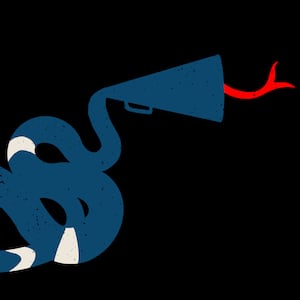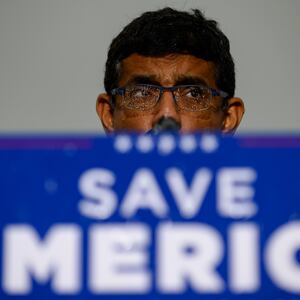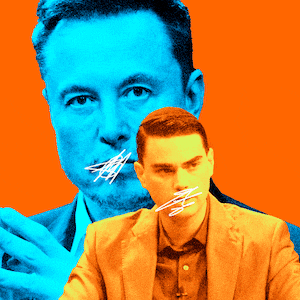There are some things that are unknowable but, without a scintilla of evidence, should not be entertained as serious.
One of those is the notion that a conspiracy of “institutions”—the mainstream media, pharmaceutical companies, center-left politicians, and other monsters of “The Cathedral”—has manufactured multiple accusations against comedian and podcaster Russell Brand.
Brand has been accused by four women of sexual assault, as revealed in both a recent Channel 4 documentary and a Times of London investigative report. And a narrative has immediately formed not only among professional liars like Alex Jones and other internet trolls, but also from the mouths of mainstream right-wing commentators, that Brand is being persecuted by a vast conspiracy because of his anti-establishment commentary.
This is stupid. Full stop. And anyone pushing this idea has revealed themself as a deeply unserious person.
SURE, DUE PROCESS
Let’s get this out of the way: I am a steadfast believer in the moral necessity and judicial practicality of due process.
Whether the accused is alleged 9/11 mastermind Khalid Sheikh Mohammed, mass shooters, the wrongly convicted and later exonerated Central Park Five, or preppy college lacrosse players with punchable faces—I believe in the universal rights of a presumption of innocence, the ability to challenge evidence presented against the accused, and a fair trial by a jury that is as impartial as can be found. This applies to the most “obviously guilty” or personally reprehensible, just as it applies to the falsely accused. It’s the universality of the right that endows its strength.
Naturally, I believe Russell Brand should enjoy these same rights if and when he faces criminal charges.

A phone shows an ad for Russell Brand’s March 9, 2020 show that was cancelled.
Paul R. KaneI also simultaneously believe—in the interests of preserving a culture where even the least popular people aren’t immediately stripped of their income following an accusation—that a company like YouTube shouldn’t summarily demonetize Brand’s entire channel, but also, as a private company, that YouTube has the right to not want Brand to make a profit off its platform. (Freedom and justice are often full of contradictions!)
But the Brand-was-framed conspiracy theorists don’t really want due process—they seek to poison the well of public perception by reflexively dismissing the credible accusations by four women who do not know each other and who presented damning evidence in news investigations that were years in the making.
And the conspiracy theorists either outright state or obliquely imply that the accusers are tools of a vast conspiracy to take down Brand for his anti-establishment views.
It’s not plausible to the fantasists that a cone of silence could exist around a powerful, rich, or famous person—where the big shot’s long history of reprehensible behavior is swept under the rug or excused as being in the past and, therefore, no longer relevant. Likewise, they can’t accept the possibility that recovering from trauma can be a long process, and that victims who eventually choose to fight back often find the process only prolongs their agony—especially when their motives are impugned based on absolutely nothing.
Even right-wing firebrands like Candace Owens and Megyn Kelly—both oft-prone to conspiracy theorizing—say Brand deserves due process, but also that the currently available evidence is convincing and the accusers should not be dismissed or discredited out of hand.
And yet, some mainstream media figures with large platforms lack the thoughtful and sober reflection of (yes, really) Candace Owens and Megyn Kelly.
Elon Musk, the world’s richest man, came out in support of Brand, declaring, “That man is not evil,” while also approving of Brand’s own conspiracy theory that he’s being set up by the media and other institutions for his political views.
Tucker Carlson, who until recently was the most watched host in cable news, said of the accusations against Brand, “Criticize the drug companies, question the war in Ukraine, and you can be pretty sure this is going to happen.”
Right-wing podcaster Dave Rubin posted, “The Machine has set its sights on Russell Brand. Does anyone buy this stuff anymore?”
Libertarian pundit Robby Soave—in perhaps the platonic ideal of “but the media” whataboutism—conceded that the allegations have “some corroboration,” but added, “On the other hand, you can't discount that these allegations are only surfacing now because Brand has become adversarial to mainstream institutions.”
Even the popular conservative commentator Ben Shapiro—who at times has been willing to disappoint his audience by not credulously parroting baseless conspiracy theories, like when he said Dinesh D’Souza’s Big Lie-promoting documentary, 2000 Mules, failed to provide any actual evidence that the 2020 election was stolen—has jumped into the Brand conspiracy fever swamp.
Angrily noting that some of the allegations involve events that are at least a decade old, Shapiro said, “when Russell has just decided that he is not in favor of a lot of sort of left-wing narratives, ranging from COVID to wokeness, when that happens suddenly you have a coordinated attack… I find the timing at least somewhat suspicious. When I say ‘somewhat,’ I mean ‘a lot’ suspicious.”

Russell Brand leaves the Troubabour Wembley Park theatre in north-west London on Sept. 16, 2023.
James Manning/Getty ImagesAnd what institution-shattering, paradigm-shifting ideas inspired the “Machine” to go after Brand? As The Guardian noted, “Videos he has posted in recent weeks include titles such as ‘What REALLY started the Hawaii fire?’, ‘State of fear! Covid propaganda exposed!’ and ‘Zelensky’s MASSIVE Ukraine censorship EXPOSED.’”
GULLIBLE NARCISSISTS
Conspiracy theories typically proliferate when a kernel of truthful information seeds an infinite number of branches of possibilities that, no matter how implausible or contradictory, only serve to further prove that the powerful are keeping “the truth” from the people.
Obsessive conspiracy theorists who discard their rational skepticism—and credulously lap up unproven theories that confirm their politics and indict their enemies as evil and omnipresent—are certain that they alone possess the courage and intelligence to see through the looking glass.
Summarizing a 2022 study titled, “Why do narcissists find conspiracy theories so appealing?”, Arash Emamzadeh wrote in Psychology Today that narcissists exhibit the following traits:
“The need for control and dominance, combined with the anticipation of defeat, is also associated with the belief in conspiracies.
“After all, for people who have a strong need for control and domination, blaming and scapegoating others is easier than accepting defeat.
“The need for uniqueness, typically associated with the agentic extraversion aspect of grandiose narcissism, may also increase the likelihood of belief in conspiracies. Why? Because being able to see through the ‘smoke screens that hide the incredible truth’ could give narcissists a ‘sense of being special, of being one of the few people who see the truth.’
“Another factor is gullibility: Despite their overconfidence, narcissists can be quite naïve and gullible. This may be partly due to their tendency to go with their gut feelings than to deliberate.”
I’m no psychologist, but these all sound like the qualities of a person who would look at multiple allegations against a ridiculous talk show host like Brand—backed with some credible evidence indicating serial sexual predation—and say, “This is the Deep State’s fault.”
Give Russell Brand his due process. Do not reflexively smear his accusers as liars. And for the love of God, if you do not want to earn the dismissive sobriquet of “conspiracy theorist,” do not give oxygen to the idea that Brand is a heroic martyr being persecuted by a malevolent, planet-controlling cabal. Log off and touch some grass.








